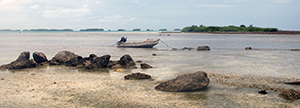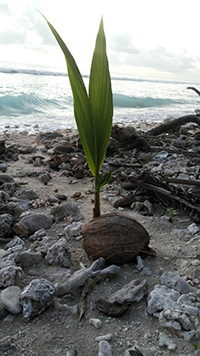Tokelau keen to monitor ocean acidification
| 7 October 2015 The conference on Ocean Acidification (OA), currently taking place in Auckland, is very relevant to the small atoll nation Tokelau. Indeed the country is keen to become one of the pilot monitoring sites for the effect of ocean acidification. This is because the coral rims the three atolls are composed of, the lagoons they encircle, and the Pacific Ocean they are surrounded by, could all be affected by OA. Fishing is a key resource for survival on the islands, as well as for generating revenue. So monitoring the effect of ocean acidification is part of the survival strategy there. |
 Fakaofo lagoon made up of coral, with fishing boat. |
| All waters in our oceans are becoming more acidic, as a result of carbon dioxide emission from burning fossil fuels –as if causing climate change isn’t bad enough! Acidic oceans particularly affect shells and corals in coastal ecosystems - and fish in all the marine environments they live in. Very little is known on the exact degree of acidification and how it affects marine life. Hence the OA conference is setting priorities in finding out more of what’s happening in the Pacific Ocean. Tokelau’s participation in this project would help in collecting data specific for the atolls, and network with other Pacific countries on lessons learned in adaptation techniques. The acidity of seawater may change both in the lagoon waters and on the outer reefs. To participate in research and actions would be valuable for building Tokelau’s capacity on OA mitigation. And so the country is keen to establish stronger relationship with the National Institute for Water and Atmospheric Research (NIWA) in New Zealand. Installation of automated data collection stations and furthering research in OA could be a key objective. |
|
| As a non-self-governing territory of New Zealand, Tokelau feels well placed for participation in this NZ-sponsored project, that is implemented through the Secretariat of the Pacific Regional Environment Programme (SPREP). Tokelau’s status often makes it miss out on aid from international donors, that tend to prefer to look after independent developing countries. Tokelau hopes that its special relationship with NZ will make it a prime contender for establishing pilot sites for research and monitoring of ocean acidification. Tokelau is very remote: its nearest port is Apia in Samoa, 500 km to the south. Being so remote from western civilisation could therefore provide a prime location for ecosystems baseline assessment, through comprehensive marine biodiversity surveys. These atolls would make an excellent pilot site. [ends, JJ7oct15] For further information contact: Paula Faiva, Climate Change Unit Office of the Council for the Ongoing Government of Tokelau, Apia, Samoa Email: paulafaiva@gmail.com Pictures: Little is known how ocean acidification will affect the coral rim of atolls, and life within and outside the lagoon. Particularly the effect on fisheries could have major consequences for food security and economic survival. |
 Little is known yet how ocean acidification will affect coral rims and the life they support. |
